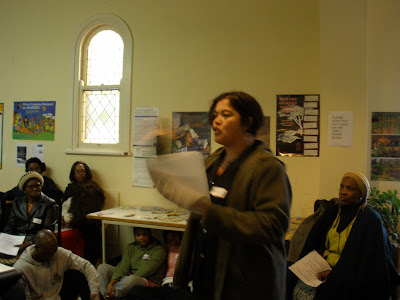
Learning Network Workshop on Health Rights 8-13-08
Wednesday, August 20, 2008
Posted by CRyb at 9:53 AM 0 comments
Speaking Truth to Power




Posted by CRyb at 8:54 AM 0 comments
Women's Day
Posted by CRyb at 5:58 AM 0 comments
Green Week August 4-8
---Yasmin
Posted by CRyb at 4:53 AM 0 comments
The Right to Health
Posted by CRyb at 4:31 AM 0 comments
GIS Time
Monday, August 18, 2008
On August 4-6 I took a road trip up the west coast with another researcher and local community
members to start the GPS data collection of Legal and Illegal (Shebeens) Alcohol Vendors.
This data will add value to the ongoing research of Fetal Alcohol Syndrome
of the Western Cape. Because colonial slavery and apartheid allowed farm owners
to pay workers in Alcohol (the "Dop" system), the spirit and culture of alcohol
dominates and is at the forefront of farm life. The towns visited include:
Porterville, Piketberg, Velddrif, and other smaller towns.
This data made me realize the following implications:
Revolutionizing the applicability of GIS in public health
Targeting outreach initiatives
Raising awareness that Alcoholism is a DISEASE and new strategies for intervention and treatment
Peeling back the layers of this gorgeous scenery, I find beautiful and strong people
who are marginalized and need help. This data will be applied to the scope and initiatives
of academia, Community-Based Organizations, NGOs, church, and local mobilization.
--Yasmin
Posted by CRyb at 2:14 PM 0 comments
Interviewing Skills
On July 31 and August 2, 2008 I had the pleasure to test out my Afrikaans and interviewing skills.
It rained the whole day--Cape Town winter rain, but our dedication would not deter.
Bev (an Afrikaans speaker) and I used the collaboration with the Women on Farms NGO
to find potential interviewees for the individual interviews. We initially
began in a farm township outside of Stellenbosch, but shifted to a farm close
by as all the women were off from work due to the rain and they all lived on the
farm too. Housing is a huge issue of farm life and is sought after for farm workers.
From one dwelling to the next, the setting was day and night and I soon understood
why housing is a prized possession.
Here are pictures of the vineyard in which we conducted the 6 of the 10
interviews. The other 4 were completed on August 2 at the NGOs headquarters.
The interviewing allowed me to search within myself and offer a comforting environment
that allow for women to open up about health and disparities. These skills and
strategies will be an asset to Consciously Rebuilding and our community outreach
and data collection.
--Yasmin
Posted by CRyb at 1:51 PM 0 comments
Just Health Care
On July 30, 2008 (Happy Birthday Bradley!!!), I attended a faculty induction of Dr. Di McIntyre into the UCT School of Public Health and Family Medicine--Health Economics Division. During the induction speech, Dr. McIntyre highlighted the direction of health care and health systems in South Africa and the need for rights, Private-sector responsibility, infrastructure capacity for the public-sector, prevention, education, and more support for the small minority who contributes funds for health insurance--a pool that benefits the entire system of users.
--Yasmin
Posted by CRyb at 1:27 PM 0 comments




























